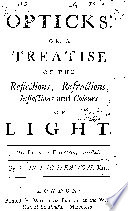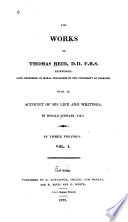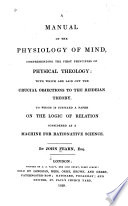 Is not the Sensory of Animals that place to which the sensitive Substance is present, and into which the sensible Species of Things are carried through the Nerves and Brain, that there they may be perceived by their immediate presence to that Substance? Is not the Sensory of Animals that place to which the sensitive Substance is present, and into which the sensible Species of Things are carried through the Nerves and Brain, that there they may be perceived by their immediate presence to that Substance?  Elements of the Philosophy of the Human Mind - Page 44by Dugald Stewart - 1821Full view Elements of the Philosophy of the Human Mind - Page 44by Dugald Stewart - 1821Full view - About this book
 | Isaac Newton - 1730 - 403 pages
...wdiich the fenfitive Sub. fiance is prefent, and into which the fenfible Species of Things are carried through the Nerves and Brain, that there they may be perceived by by their immediate prefence to that Subftance ? And thefe things being rightly difpatch'd, does it... | |
 | Dugald Stewart - 1811 - 620 pages
...world, and the sentient principle ? " Is not the sensorium of animals," he asks in one of his queries, " the place where the sentient " substance is present,...things are brought through the nerves and brain, that they "may be perceived by the mind present in that place?" It ought to be remembered also, that this... | |
 | Thomas Taylor - 1812 - 622 pages
...which the sensitive substance is present ; and into which the sensible species of things are carried through the nerves and brain, that there they may be perceived by their immediate presence to that substance ? And these things being rightly dispatched, does it not... | |
 | Frederick Beasley - 1822 - 584 pages
...the soul, and Sir Isaac Newton, expresses himself in a query to this effect. " Is not the sensorium of animals, the place where the sentient substance...may be perceived by the mind present in that place? And is there not an incorporeal, living, intelligent, and omnipresent being, who, in infinite space,... | |
 | Thomas Reid - 1822 - 432 pages
...that modesty which distinguished him no less than his great genius. " Is not, says he, the sensorium of animals the place where the sentient substance...present, and to which the sensible species of things arebrought through the nerves and brain,that there they may be perceived by the mind present in that... | |
 | Thomas Reid - 1827 - 706 pages
...modesty which distinguished htm no less than his great genius. " Is not," says he, " the sensorium of animals the place where the sentient substance...may be perceived by the mind present in that place ? And is there not an incorporeal, living, intelligent, and omnipresent Being, who, in infinite space,... | |
 | Dugald Stewart - 1829 - 510 pages
...perception, approaching very nearly to the language of Descartes. " Is not," says Newton, " the sensorium of animals the place where the sentient substance...may be perceived by the mind present in that place?" And still more confidently Dr. Clarke : " Without being present to the images of the things perceived,... | |
 | John Fearn - 1829 - 256 pages
...asserting in substance, according with a query put by Newton, that the ' Sen' sorium of animals is the place where the sentient ' substance is present...may be perceived by ' the mind present in that place ;' adds a foot note, in which he says — " This phrase of ' the soul " being present to the images... | |
 | Dugald Stewart - 1829 - 518 pages
...perception, approaching very nearly to the language of Descartes. " Is not," says Newton, " the sensorium of animals the place where the sentient substance...nerves and brain, that there they may be perceived by tVe mind present in that place ? " And still more confidently Dr. Clarke : " Without being present... | |
 | Dugald Stewart - 1829 - 518 pages
...pereeption, approaching very nearly to the language of Descartes. " Is not," says Newton, " the sensorinm of animals the place where the sentient substance...through the nerves and brain, that there they may be pereeived by the mind present in that place?" And still more confidently Dr. Clarke: " Without being... | |
| |